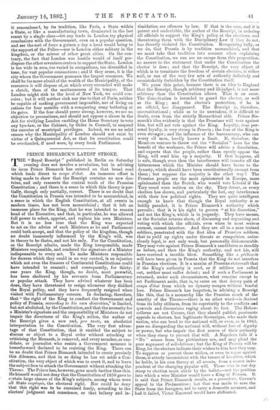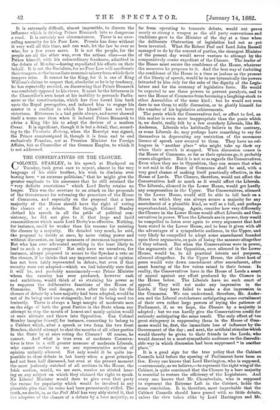PRINCE BISMARCK'S LATEST STROKE.
THE "Royal Rescript " published in Berlin on Saturday evening does not involve a revolution, but in advising its issue Prince Bismarck has entered on that broad road which leads direct to coups tre'tat. An immense effort is being made to show that the Rescript contains no new doc- trine, and only reasserts the central truth of the Prussian Constitution ; and there is a sense in which this theory is par- tially, though only partially, correct. There is no doubt that the Constitution in Prussia was intended to be monarchical, in a sense in which the English Constitution, at all events in modern times, has not been monarchical ; that it left an immense place for the King, that he was intended to remain head of the Executive, and that, in particular, he was allowed full power to select, appoint, and replace his own Ministers. But it is no less true that the King was expected to act on the advice of such Ministers as he and Parliament could both accept, and that the policy of the kingdom, though no doubt immensely influenced by the King's will, was in theory to be theirs, and not his only. For the Constitution, as the Rescript admits, made the King irresponsible, made Ministers responsible, and rendered the signature of a Minister indispensable to every act. To make Ministers responsible for decrees which they could in no way control, is an injustice which not even the framers of Continental Constitutions could have intended to commit ; and consequently, for thirty- one years the King, though, no doubt, most powerful, has been sheltered by his servants from Parliamentary or popular attack. They have advised whatever has been done, they have threatened to resign whenever they disliked the Royal policy, and they have frequently resigned when visited with Parliamentary censure. In declaring, therefore, that " the right of the King to conduct the Government and policy of Prussia, according to his own discretion," is limited, but not abolished, by the Constitution, and that the necessity for a Minister's signature and the responsibility of Ministers do not impair the directness of the King's action, the author of the Rescript gives a new and, pro tanto, an absolutist interpretation to the Constitution. The very first advan- tage of that Constitution, that it enabled the subject to discuss or object to a Royal order without attacking or
criticising the Monarch, is removed, and every member, or can-
didate, or journalist who resists a Government measure is henceforward declared to be resisting the King. There can be no doubt that Prince Bismarck intended to create precisely this dilemma, and that in so doing he has set aside a Con- stitution, the very object of which was to avert it, and to leave the subject free to attack the Government without attacking the Throne. The Prince has, however, gone much farther than this. He himself would not deny that the Constitution of 1850 gave to certain large classes of the King's subjects, among whom were all State employes, the electoral right. Nor could he deny that this right was to be exercised freely, according to the electors' judgment and conscience, or that bribery and in-
timidation are offences by law. If that is the case, and it. is patent and undeniable, the author of the Rescript, in ordering all officials to support the King's policy at the elections, and threatening them with the Disciplinary Law if they do not, has directly violated the Constitution. Recognising fully, as we do, that Prussia is by tradition monarchical, and that we must take that tradition into account when explaining the Constitution, we can see no escape from this proposition, no answer to the statement that under the Constitution the elector is free ; and that the Rescript, the very object of which is to terminate the freedom of certain electors, is either null, or one of the very few acts of authority definitely and unmistakably forbidden by the Constitution itself.
We press this point, because there is an idea in England that the Rescript, though arbitrary and ill-judged, is not more arbitrary than the Constitution allows. That is an error. The Constitution is intended to guard the elector, as well as the King ; and the elector's protection, if he is
an official, has disappeared. The Rescript is, therefore, unconstitutional ; while as to its unwisdom, it is difficult to doubt, even from the strictly Monarchical side. Prince Bis- marck's idea evidently is that the Prussians will rote against him, but will not vote against the King. Loyalty, true per- sonal loyalty, is very strong in Prussia ; the fear of the King is even stronger ; and the influence of the bureaucracy, who can worry all men, hardly knows a limit. If, therefore, the -Members venture to throw out the " Socialist " laws for the benefit of the workmen, the Prince will advise a dissolution, and expects that the people, rather than openly oppose the King, will send him up a majority. If that happens, all is safe, though even then the interference will transfer all the bitternesses which the Minister should have borne to the dynasty, which should have been constitutionally exempt from them ; but suppose the majority is the other way ? The Prussian people are the most opinionated in Europe, more opinionated than the Scotch, who would vote Liberal if the Tory creed were written on the sky. They detest, as every election has shown, and particularly the last, any interference with their few political rights. They are quite intelligent enough to know that though the Royal authority is so boldly paraded, it is Prince Bismarck's authority which prevails ; that it is his right to govern " at his discretion," and not the King's, which is in jeopardy. They have means, as the Socialist returns show, of discussing and organising and voting with which the officials, even when in most serious earnest, cannot interfere. And they are all to a man trained soldiers, penetrated with the first idea of Prussian soldiers, that to yield up rights under threats or compulsion, unless clearly legal, is not only weak, but personally dishonourable. They may vote against Prince Bismarck's candidates as steadily as before, and then the King's authority, and not his, will have received a terrible blow. Something like a plebiscite will have been given in Prussia that the King do not interfere in Prussian elections. It is a maxim of Prussian statecraft that if the King's authority is used, or if soldiers are called out, neither must suffer defeat ; and if such a Parliament is returned, under such circumstances, what remains except to set Parliament aside, that is, to enter on that dreary path of coups d'itat from which no dynasty escapes without fearful loss. Prince Bismarck has forgotten, in advising a Rescript like this, that in a monarchy like the Prussian much of the sanctity of the Throne—there is no other word—is derived from its lofty stillness, from its superiority to the conflicts and quarrels and discussions raging about its foot. The Hellen- zollerns are not Caesars, that they should publish passionate appeals to electors, but legitimate Sovereigns, who made their
nation, who can bend to the national will, or even, as in 1863, pass on disregarding the national will, without loss of dignity or power, but who impair the first source of their authority when they stoop to pervert that will. A Napoleon falls if a "No " comes from the plebiscitary urn, and may plead the poor argument of self-defence ; but the King of Prussia will be King, let the electors indicate their wishes to him how they may. To suppress or pervert those wishes, or even to argue against them, is utterly inconsistent with the tenure of his office, which he holds, in his own theory at all events, from a source inde- pendent of the changing popular will. Those who in our day stoop to election must abide by the ballot,—not the position into which a wise Minister would force a King of Prussia. It is said that Prince Bismarck recalls, as a precedent, Cavonr's appeal to the Piedmontese ; but that was made to save the State from the foreigner, not to carry a domestic measure, and had it failed, Victor Emanuel would have abdicated.
It is extremely difficult, almost impossible, to discern the influence which is driving Prince Bismarck into so dangerous a road. It is certainly not circumstances. There is no over- ruling necessity for his Poor Law. Prussia has done without it very well all this time, and can wait, let the law be ever so wise, for a few years more. It is not the people, for the people are all the other way, even the artisan class—as the Prince himself, with his extraordinary frankness, admitted in the debate of Monday—having repudiated his efforts on their behalf. It is not the Socialists, for no Poor Law will ameliorate their tempers, o r the immediate economic misery from which their tempers arise. • It cannot be the King, for it is one of King Williams claims to respect that, absolutist as he is by tendency, he has repeatedly receded, on discovering that Prince Bismarck was resolutely opposed to his views. It must be the bitterness in the Chancellor's own heart at his inability to persuade Parlia- ment or the constituencies, which has thus forced him back upon the Royal prerogative, and induced him to engage his master in a conflict in which he himself has not been victorious. Bitterness is a bad guide always, and never showed itself a worse one than when it induced Prince Bismarck to advise a King like his to adopt the devices of a modern Omar. It is significant, though it is but a detail, that, accord- ing to the Vossische Zeitang, when the Reseript was signed, the Prince countersigned it, though it is from end to end exclusively Prussian, not as Prussian Minister for Foreign Affairs, bnt as Chancellor of the German Empire, to which it is not addressed.







































 Previous page
Previous page